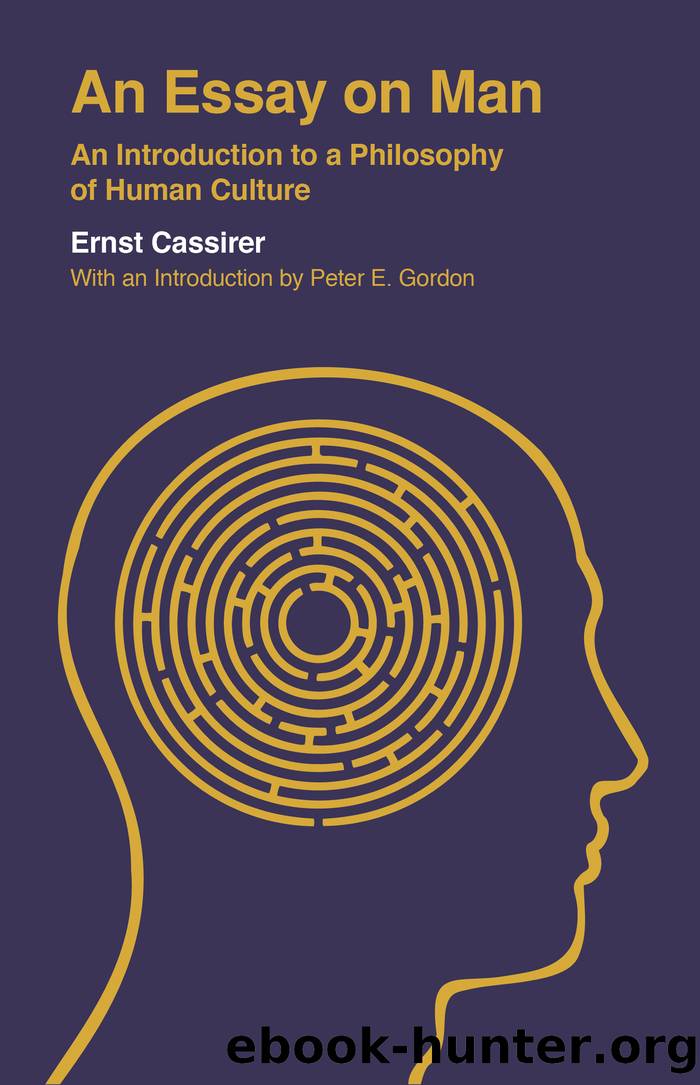An Essay on Man: An Introduction to a Philosophy of Human Culture by Ernst Cassirer

Author:Ernst Cassirer [Cassirer, Ernst]
Language: eng
Format: epub
Tags: history, General, philosophy, epistemology, Metaphysics
ISBN: 9780300254075
Google: 0BMsEAAAQBAJ
Publisher: Yale University Press
Published: 2021-11-15T00:24:33.010523+00:00
2
The question of the origin of language has, at all times, exerted a strange fascination upon the human mind. With the first glimmerings of his intellect man began to wonder about this matter. In many mythical tales we are informed how man learned to talk from God himself or with the assistance of a divine teacher. This interest in the origin of language is easily understandable if we accept the first premises of mythical thought. Myth knows of no other mode of explanation than to go back to the remote past and to derive the present state of the physical and human world from this primeval stage of things. It is, however, surprising and paradoxical to find the same tendency still prevailing in philosophical thought. Yet here for many centuries the systematic question was overshadowed by the genetic. It was thought to be a foregone conclusion that, the genetic question once solved, all the other problems would readily follow suit. From a general epistemological point of view, however, this was a gratuitous assumption. The theory of knowledge has taught us that we must always draw a sharp line of demarcation between genetic and systematic problems. Confusion of these two types is misleading and perilous. How is it that this methodological maxim, which in other branches of knowledge appeared to be firmly established, was forgotten when dealing with linguistic problems? It would of course be of the greatest interest and importance to be in possession of the full historical evidence regarding languageâto be able to answer the question whether all the languages of the world derive from a common stem or from different and independent roots, and to be able to trace step by step the development of individual idioms and linguistic types. Yet all this would not suffice to solve the fundamental problems of a philosophy of language. In philosophy we cannot content ourselves with the mere flux of things and with the chronology of events. Here we must in a sense always accept the Platonic definition according to which philosophical knowledge is a knowledge of âbeing,â not of mere âbecoming.â To be sure language has no being outside and beyond time; it does not belong to the realm of eternal ideas. Changeâphonetic, analogic, semantic changeâis an essential element of language. Nevertheless the study of all these phenomena is not enough to make us understand the general function of language. For the analysis of every symbolic form we are dependent on historical data. The question as to what myth, religion, art, language âareâ cannot be answered in a purely abstract way, by a logical definition. On the other hand when studying religion, art, and language we always meet with general structural problems belonging to a different type of knowledge. These problems must be treated separately; they cannot be dealt with and they cannot be solved by merely historical investigations.
In the nineteenth century it was still a current and generally accepted opinion that history is the only clue to a scientific study of human speech.
Download
This site does not store any files on its server. We only index and link to content provided by other sites. Please contact the content providers to delete copyright contents if any and email us, we'll remove relevant links or contents immediately.
| Africa | Americas |
| Arctic & Antarctica | Asia |
| Australia & Oceania | Europe |
| Middle East | Russia |
| United States | World |
| Ancient Civilizations | Military |
| Historical Study & Educational Resources |
Never by Ken Follett(2887)
The Man Who Died Twice by Richard Osman(2301)
Machine Learning at Scale with H2O by Gregory Keys | David Whiting(2294)
Fairy Tale by Stephen King(2073)
Will by Will Smith(2045)
Rationality by Steven Pinker(1768)
The Dawn of Everything: A New History of Humanity by David Graeber & David Wengrow(1571)
The Dark Hours by Michael Connelly(1571)
Principles for Dealing With the Changing World Order: Why Nations Succeed and Fail by Ray Dalio(1380)
Friends, Lovers, and the Big Terrible Thing by Matthew Perry(1333)
A Short History of War by Jeremy Black(1300)
HBR's 10 Must Reads 2022 by Harvard Business Review(1257)
Go Tell the Bees That I Am Gone by Diana Gabaldon(1237)
Can't Hurt Me: Master Your Mind and Defy the Odds - Clean Edition by David Goggins(1230)
515945210 by Unknown(1210)
Fear No Evil by James Patterson(1111)
443319537 by Unknown(1075)
Works by Richard Wright(1020)
Going There by Katie Couric(993)
